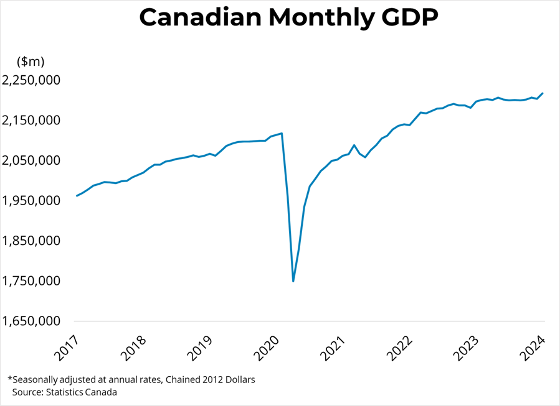Canadian real GDP grew 0.6 per cent in January, following a 0.1 per cent contraction in December. The growth was driven by services-producing sectors, which rose by 0.7 per cent. The resolution of public sector strikes in Quebec led to a jump in educational and social services GDP, reversing declines in the prior two months. Residential construction activity fell by 1.5 per cent, declining for the third consecutive month following a burst of activity in the summer and fall. Offices of real estate agents and brokers increased for the second consecutive month, rising 4 per cent as higher home sales in the greater Toronto region contributed to growth. Preliminary estimates suggest that output in the Canadian economy rose 0.4 per cent in February.
As striking teachers and social workers in Quebec returned to work and buoyed economic growth, the Canadian economy began 2024 with solid GDP momentum. Growth stalled in the latter half of 2023, but the January number and the February preliminary estimate suggest that the economy is regaining some strength to start the year. Decent economic growth could also reduce pressure on the Bank of Canada to cut rates, although financial markets continue to expect a first cut to occur in June. With inflation below 3 per cent for the previous two months, the Canadian economy is now experiencing disinflation and growth, putting the Bank of Canada in a more comfortable position as it decides when and how much to cut. Markets continue to expect the Bank to hold rates at its next announcement on April 10th. 
Link: https://mailchi.mp/bcrea/canadian-real-gdp-growth-january-2024
For more information, please contact: Gino Pezzani.
Comments:
Post Your Comment: